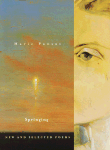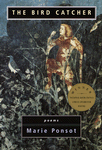From the April 2000 Knopf Question-a-Poet Contest
Question for Marie Ponsot:
1. What role does poetry, a medium of great patience and where so much occurs between the lines, have in today's world of fast-paced everything, over-indulgences, and cutthroat attempts to gain our attention? Can poetry matter to the people stuck in this meat-wheel or should we leave it for those who have been absorbed into the academies? --Douglas Mowbray, Baltimore, MD
Marie Ponsot replies:
The louder the calls to be consumers the more we need -- and relish -- poetry. Need -- yes, need. Anthropologists in the last century recorded over and over examples of life in places of extreme climactic severity, where people owned nothing but absolute necessities. Those people who had nothing but, say, a hunting tool and a lot of ice had poetry, plenty of it, poems and songs for the sake of the life in them. There's a primitive need for language that works as an instrument of discovery and relief, that can make rich the cold places of our inner worlds with the memorable tunes and dreams poems hold for us. Poetry's free! You can memorize all of Shakespeare -- no charge! And you can write your own unsuspecting lyrical self and time you want to. Poetry takes time -- and makes something of it. The one price you pay for poetry is attention. It will take our attention back from the propagandists of greed, and makes a place for us to pay it. (Even academics are breathing and beautiful, with enough attention to poems.)
2. What makes a piece of writing, if it doesn't rhyme, poetry, and not just terse prose cut up into odd lengths of line? -- Barbara L.
Poetry is like love -- easy to recognize when it hits you, a joy to experience, and very hard to pin down flat in a satisfying definition. The wider my reading, the wider my private definition has grown. Here are some parts of how I think about it: it's passionate speech; language on a rampage; play with verbal tunes and rhythms; haunted, resonant, delicious, memorable, arresting language; language as an instrument of discovery. Sounds of words ease the poet's search for a usable truth. Sometimes a great structure helps make a poem (for writer and for reader who must also make the poem!) . . . check out the Iliad, its echoing parts. (It begins with the withholding of gifts, and ends with the giving of gifts.) Or check out the quick recall rhymes foster: "Brightness falls from the air / Queens have died young and fair . . ." Artists like to experiment with edges, verges, limits in their art, trying to push the envelope. They also like to swipe from the gigantic history of art whatever devices they find attractive. No one definition encompasses them all, and so no one definition is applauded by everyone who loves poetry. But it doesn't take long to get your own personal criteria sensitive to what, as you read it, convinces you it's a poem. For a deeply gratifying and magisterial investigation of what a poem is, I suggest you read Problems of Art by Suzanne K. Langer.
3. Do you earn a living wage? -- Janet Pinkston, Louisville, KY
Brilliant! This question goes right to the core of one of poetry's oddest assets: it's the one art from which no one makes a direct living, and thereby escapes many deforming pressures. Poets are free, if they have an old pencil and the back of an envelope and a mother tongue, to make fools or geniuses or bores out of themselves according to rules they themselves invent and accept.
Poetry doesn't give poets a lot of money or a lot of glory; what it does give is not a living but a wonderful, wonderful life. Poets never need be bored or at a loss for something exciting to ask about, talk about, dream up, think over. That's not a wage, but it surely improves living.
If you believe, as I do, that poetry is a part of the world's work -- a human need -- you don't feel time spent on poetry is idle. Poetry's not a luxury but a deep and permanent part of language making. No matter how you earn your living, you can take your share of that part.
I'm lucky to be addicted to teaching, and in having earned my living that way (among other ways) for a long time. Reading, teaching, and writing poems feels to me like a constant exchange of energies with other people. And it puts bread on the table.
4. I really enjoyed your poem "Separate, in the Swim" because this poem described so exactly the feeling of communion with the ocean that I feel whenever I am swimming. What I see in the poem is the juxtaposition between the speaker's communication with the ocean and her estrangement with the man who sleeps in the sun. The only thing is, I have trouble with the last line not because it's not clear or doesn't fit. Actually it fits perfectly well. It is what we do after a swim. But for some reason that I can't quite figure out it fits almost too well. The penultimate line is so grand "You have taken in the sun." Also I feel that using that line as the end would have enveloped the poem so nicely because the first lines of the poem speak of the "you" as simply idling. I would like to understand why you ended the poem this way. It just seems to me that if the speaker has had this very sensual experience in the ocean she would not want to dry herself off and return to being a land creature so quickly. -- Aylin An, Springfield, VA
How lovely of you to ask! I'll try to say what I had in mind, because I think it's part of the pleasure of re-writing to make sure that every word needs to be there in the poem; I do that by sensing the reasons for each word's presence. If there aren't more two reasons, I try to take the word out. (Some of the words won't go -- they assert their right by virtue of their mystery.)
Here's some of my rationale: I wanted to end with the speaker out of the water, active, taking responsibility for herself, resuming contact with the earth and human nature. I wanted the sensual images in the feel of towel, sun, sand to outline her sense of her own presence on the spot. I even thought the reader might imagine something about the range of different moments; the speaker is wet/dry; the you is just dry. Also the you/I begin the poem in that order, so the end has a faint echo of symmetry that I like.
Two questions:
5. What is your inspiration for a poem? That is, in general, do you have a glimpse of the overall idea of the poem (your poems seem so centered, each word relating to its core), or do you know the ending first and then work towards the beginning or something else entirely? -- Stephanie Anne N., Essex Junction, VT
6. I notice the sampling of your work at this site is quite diverse. Can you tell me, in your writing, do you find yourself following any particular themes for extended periods of time, or is your inspiration random? Specifically, is your process such that you sit in front of your typewriter or computer and "create" or do you intentionally address certain issues or topics until they are completely (perhaps exhaustively) expressed? -- Ar Foster, Fort Collins, CO
Alice Quinn, a great editor and lover of poetry, has said, "If we knew where poetry comes from, we'd all go there!" Yes, we would, in a great rush. Sometimes a subject haunts me until I find a way to begin to write it. Sometimes I start with a line or phrase, often worded as an image. Such lines often occur to me while I'm out walking idly around. (New York is a fine city for walkers. It's full of sounds, odors, sights, lots of sensual events, to which one may pay close heed or no heed at all.) What I then begin to want to do is write. If I'm lucky, I scribble a few words on a paper from my pocket. Then I can start with a kernel and let it be there, what I might get to know that I didn't know I knew. The randomness of the start-up entertains me and leads me on. Of course there are other times when I have, in a more reasonable way, a subject or cloud of unknowing interest -- a memory triggered by a fresh sight in the street, or a face seen in a shop window, or a storm coming up the sky. And now and then I'm haunted by a motif or theme that doesn't begin to emerge until I sit and scrawl sentences for a time.
For me, everything can be a poem or in a poem. I guess it depends on luck -- when I can take time, what I happen to fish up. I like a poem to be an entity, itself. I write poems one by one. My books don't have a universal narrator, speaking out of the same idea or point of view, because I don't have a tidy mind. It's more of a mish-mash. Poems are more separate, for me, than are chapters in a novel. (But I know some wonderful books of poems which are dedicated to one subject and/or are composed with an identifiable and unchanging speaker.)
Re-writing is the best part of writing for me. I recopy the piece by hand, until it begins to speak to me, changing or re-affirming what's there. At best, it begins to spin ahead of me to say something, terms or sounds, that I'd not expected. You are in charge here. One theme or many, the author is the authority!
������


